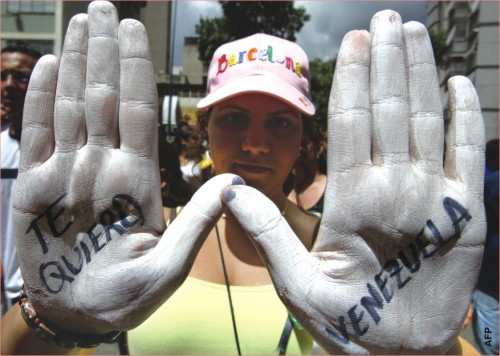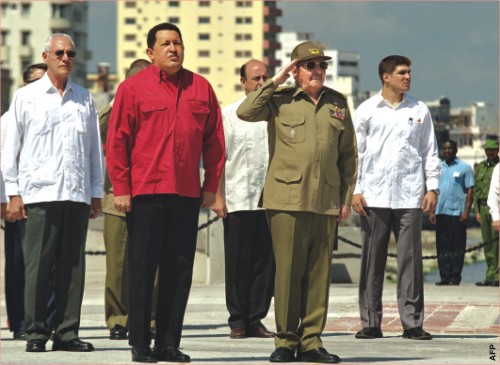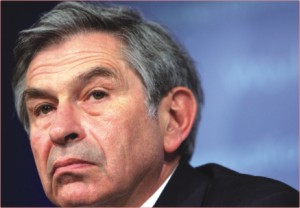
Inside
|
Waving goodbye to the Fund and the Bank The time has come for us to consider following Venezuela's lead, argues Farid Bakht The International Monetary Fund and the World Bank are not used to being told to pack their bags. Having things their way for most of their six decades in existence, they are in a crisis. The IMF had around $100 billion in loans in place around the world, three years ago. Today, that has dwindled to only $20 billion. Half of that is with one country, Turkey. The IMF is losing Latin America. The World Bank is losing credibility as no one now buys their line, otherwise known as the "Washington Consensus." It faces far bigger issues than the petty corruption of its ex-president and his girlfriend. The rich countries do not take their advice. They certainly do not follow their guidelines when it comes to managing their own economies. The US and UK can run up huge trade deficits but ignore the tenets of orthodox Fund thinking. Yet, when it comes to the Third World, they come down hard on any wavering government. The Aid Consortium works in unison with the Bank and the Fund. It does not help that most of the poor governments are weak, lacking in principle, and happy to play ball in return for Western support. That is why, in most of these countries, there is hardly any political debate about disastrous Fund or Bank policies. Witness the political debate in the three largest South Asian countries, Pakistan, India and Bangladesh. In each, the two largest political parties accept the basic premise of these two institutions. That is why they resort to issues of identity, religion and nationalism to offer a "choice" to the electorate. When it comes to bread and butter issues about economic progress, farming, industry and development, they are not as far apart as they pretend to be. Beyond the rhetoric, they sing from the same hymn sheet.
Most of the leaders of civil society also offer no serious challenge to the status quo. Some make a good show of token opposition in seminar rooms, and the occasional demonstrations which are well choreographed, with digital photos despatched to financiers in the West. However, there is no political pressure to even negotiate a less onerous financial package. In Bangladesh, the Bank effectively (though not officially) writes the economic program, and the politicians fall in line in expectation of aid goodies. No one is contemplating waving goodbye to these august financial institutions in this region, except perhaps in Maoist dominated Nepal. We have to look far away to see defiance against the Two. The threat of an example Having come to office in 1998, Chavez has taken a relatively long time to rid his country of the IMF and World Bank. He started off as a social democrat, careful not to frighten voters with a radical message. Even then the private (opposition) media and business houses mounted a ferocious challenge; including trying to bring down the crucial oil industry through a put-up union strike. Then came the coup, followed by "recall" referendum, on top of elections. They failed miserably in the elections, recognised as free and fair. The dark side of US "democracy" organisations came to the fore in Venezuela. If you believe their propaganda about helping democratic practices in South Asia, then take a closer look at their activities in Venezuela. If you want to know more in detail, log onto www.venezuelanalysis.com. Suffice it to say that the US government finances the National Endowment for Democracy (NED), which doles out money to the National Democratic Institute (NDI) and International Republican Institute (IRI) among others. They, in turn, give financial and political guidance to NGOs working to organise the right wing opposition. In effect, there was an unholy alliance between these "democracy" organisations, the US government and the World Bank and IMF to get rid of Hugo Chavez's left of centre administration. They could not just leave Venezuela alone. The reason is that the country possesses one of the largest reserves of crude oil and gas. They also realised early on that Chavez was going increasingly to the left (even if soft rather than hard left). What were they so afraid of? Answer: what they are always afraid of -- the threat of an alternative. Add to this, his war against rapacious energy multi-nationals, siphoning out a Third World country's oil and gas with outrageous Production Sharing Agreements. The same institutions and companies are present in South Asia and in Bangladesh, too. The next time you read some innocent sounding statements by them, take a look at what they are up to in Africa and Latin America. The alternative path Similarly, millions of poor people are receiving health care for the first time in their lives, without being ripped off by quacks and private doctors. Compare that to the slum nearest your house, and imagine what kind of care they receive. The oil companies have now accepted nationalisation of their operations because they are still able to reap large profits. They are not leaving, or being kicked out. Allying with sympathetic regimes, Venezuela is creating regional structures to finance a more humane development programme to create jobs using natural resources for national progress, rather than selling them cheaply to Western multi-nationals. Parallel to this are new democratic structures for bringing local people into decision making, bypassing an elitist civil service opposed to these reforms. Brazil has made much fanfare about its "participative democracy," but nullified this by falling in line with IMF programs. This is a war being fought on several fronts. CNN and BBC hegemony over the airwaves is being challenged by a South American TV network to provide its own perspective in the competition over ideology and setting the news agenda. Central Banks lose their independence from domestic politics and have to use monetary resources for domestic programmes (such as financing the social programmes outlined above). To prevent US economic domination via "free trade" agreements, Venezuela is pushing for ALBA, a Latin American regional association interested in regional development and cooperation, rather than becoming a market for US business.
The most direct challenge to Washington is coming via a gas version of Opec, where Russia, Venezuela, Iran and Qatar seek to leverage their gas resources to shift dependence away from the US and team up instead with fuel-hungry China. The logical conclusion is to switch payment for oil and gas in US dollars to a basket of currencies (euro, yen, and yuan), thus removing the single most important prop to US economic domination over world markets. Ecuador recently kicked out the World Bank country chief because he insisted that money be spent on debt repayment rather than domestic needs. Argentina is using Venezuelan money to repay the IMF, and now follows a policy which is the opposite of what the IMF wishes to see. In sum, these US dominated organisations are in full retreat in Latin America, as that continent slowly shifts to the progressive left. Any chance in this neighbourhood? If Chavez took nine years to kick them out, and we assume it would take the same time here, then you would need to wait until 2016. That is, if there were a Chavez-like leader in place. Remember Venezuela suffered decades of corrupt two party democratic rule, where the oil resources were plundered by a greedy oligarchy in connivance with a small middle class happy to share some of the spoils. Does that sound familiar? If it takes another decade before we rid ourselves of dysfunctional politics, then I would say to the World Bank: "Carry on sending your country chiefs for another couple of decades." If Latin America gets too hot, you can cool-off in pliant Bangladesh.
No one needs to talk about getting rid of the Bank from Dhaka tomorrow. We want to start getting rid of their stranglehold over our political and economic process. This can only happen in the first instance via meaningful negotiation over economic programs. This would require our leaders to have demonstrable popular support. We would also require leaders to know what they want, as in having a coherent alternative, which would demand a shift in the Bank's position. Let our weak-kneed leaders not forget that our expatriate Bangladeshis are sending as much as five times the amount of money that the entire Aid Consortium actually spends every year (forget about aid "pledges"). They could send even more. Unfortunately, we are in the same position as the Philippines. High level of remittances: low level of political independence. When we all get excited over Two Ladies and their sons, or new NGO messiahs, we should remind ourselves that none of them are keen to stand up and offer a challenge. They just want to be invited to the party. A little further afield things are, however, shaping up for a confrontation in East Asia. After the 1997 Asian crisis, the IMF saws its chance and forced its austerity programs onto the governments, in return for bailouts (except, famously, in Mahathir's Malaysia). Most East Asian countries have learnt the lesson and are building up their foreign exchange reserves. When the next crisis occurs (as it will), they are going to be ready to stand up to the Fund, as they will not require the money. The most interesting case study for Dhaka is the current regime in Bangkok. Where have they gone wrong regarding capital markets? How can they put in place a nationalist economic program, without shooting themselves in the foot? I know our democratic politicians are all for the Bank. I wonder what some of the military think about an appropriate relationship with the Bank, where we engage in a mature way while retaining our pride and sovereignty. In other words, are they more in line with Islamabad and Manila, or are they more with Bangkok and Hanoi? Farid Bakht is the author of Bangladesh: Arrival or Departure (forthcoming).
|


 Or should we think anew? I would suggest we not be so defeatist. The Bank is also present in China, but do you for one instant think that the Communist Party of China is going to be bullied by Washington bureaucrats? They know how to negotiate. So do some East Asian countries. So do the communists in Kolkata, nearer to home.
Or should we think anew? I would suggest we not be so defeatist. The Bank is also present in China, but do you for one instant think that the Communist Party of China is going to be bullied by Washington bureaucrats? They know how to negotiate. So do some East Asian countries. So do the communists in Kolkata, nearer to home.